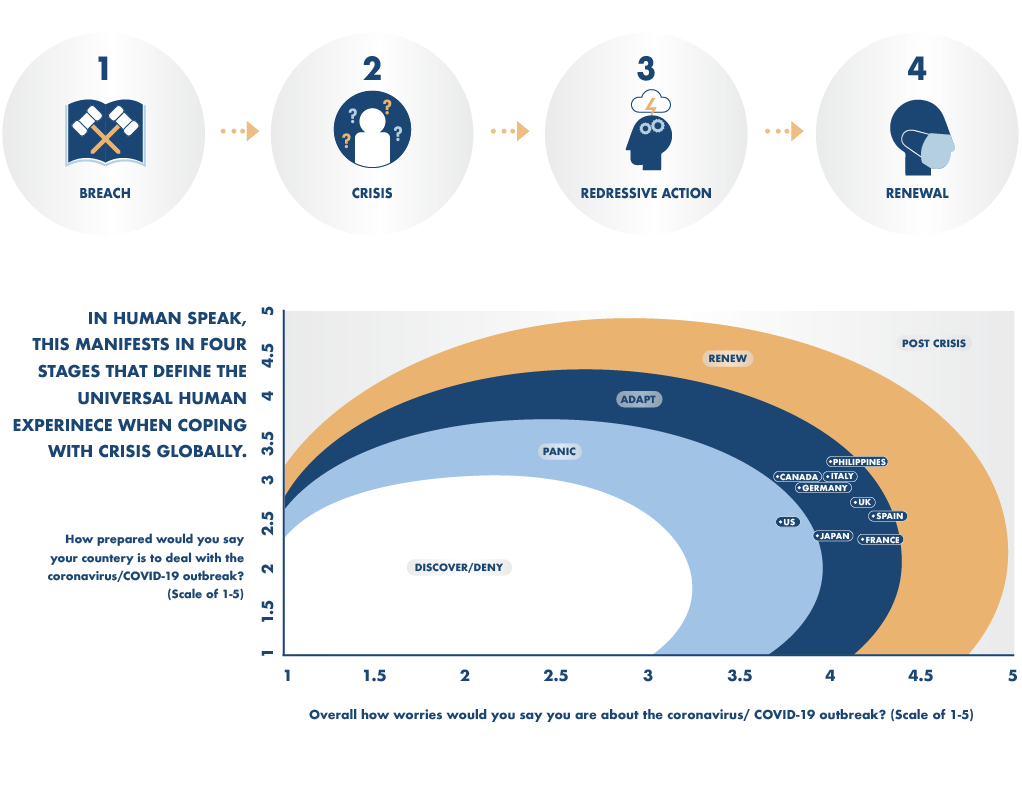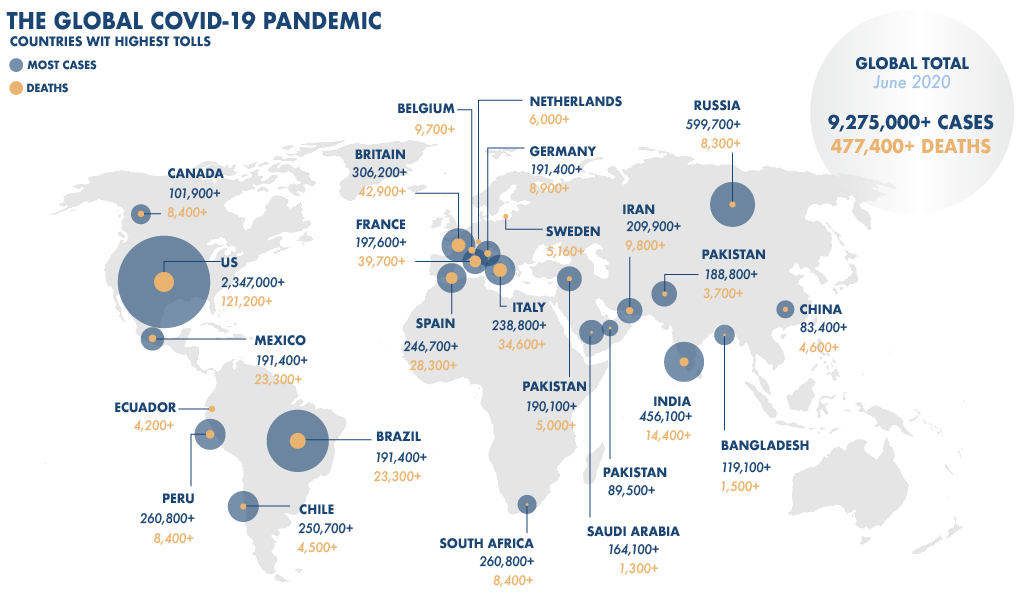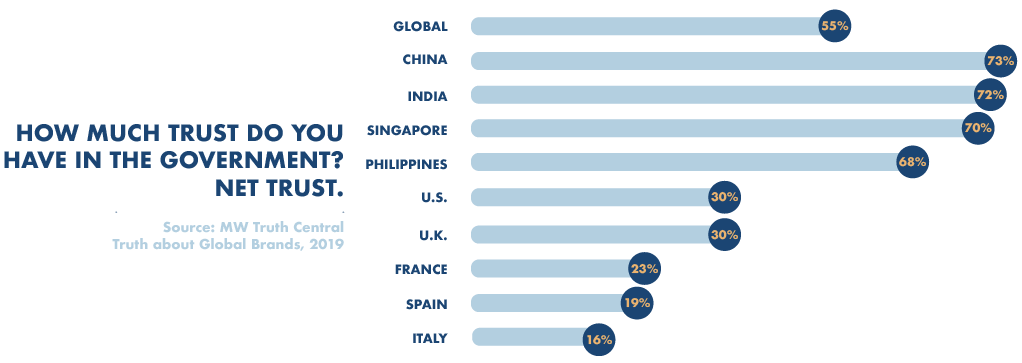Navigate Your Brand Through The Pandemic
The corona virus is unprecedented in that it’s a 3-in-1 crisis
Humanity has faced many a crisis before COVID 19. We have faced epidemics that have threatened our physical health, such as AIDS, Polio, and the Bubonic plague. We have also experienced events that have torn the social fabric and turned us against each other such as the world wars and the 9/11 attack on the World Trade Center. And we’ve gone through periods of financial strife, like the Great Depression and the Asian Financial Crisis. What makes the COVID 19 pandemic unique is that it’s three kinds of crises in one.
- It’s a health crisis – there are now over 7 million cases of COVID 19 in 188 countries, with no vaccine in sight. And with the focus of medical institutions on fighting the pandemic comes increased restrictions on access to healthcare services, increasing the anxiety of those dealing with pre-existing conditions and increasing the complexity of managing their well-being.
- It’s a social crisis – despite learning to live through lockdown and isolation, our social nature as people persists. As we worry about our health, we also find ourselves re-evaluating the way we nurture our relationships with the people closest to us, our community, and our trust of others in the society we live in.
- It’s a financial crisis – unemployment in the Philippines was reported at an all-time high of 17.7% as of April by the PSA. Lowered spending power of an entire population impacts the economy as a whole, forcing businesses across every category to re-evaluate their approach.
The complexity of our situation worsens the feeling of uncertainty. In a time of much confusion, the one thing marketers and brand owners can trust is truth. In this article, we lay down 4 truths that you can use as a starting point to navigate your business through this pandemic.

- Stage 1: Breach. The crisis emerges. One individual or group publicly breaches the common norm that regulates the status quo. Behaviors include blaming, scapegoating, marginalization, distancing, diminishment of the crisis, denial, and disavowal.
- Stage 2: Crisis. The crisis widens and extends the gap between normalcy and new context. Behaviors include panic, hoarding, resistance, and distancing.
- Stage 3: Redressive Action. The crisis is being negotiated by the use of redressive mechanisms that exist in society, and which have the goal to establish pre-crisis-like social peace. Behaviours include generosity, reciprocation, protection, insurance, and sacrifice.
- Stage 4: Renewal. In most cases, pre-crisis like status is impossible to achieve. However, resolution of the problem is negotiated; change is legitimized, and renewal is possible. Behaviours include adaptation, reintegration, innovation.



Market context can create very different expressions of each stage in the pandemic map. Just because two countries are in the same phase doesn’t mean people will respond in the same way. Truth Central, our global thought leadership unit has mapped out the journey of people from different countries by running a quantitative study around people’s responses to the pandemic.
- What we saw from respondents in the Philippines back in April was that people are feeling that we are entering the Adaptation phase (using weighted average scores on the pandemic map axes). This is potentially fueled by our culture that has been shaped with a narrative of optimism and resilience.
- And we have seen new habits emerge that we believe are likely to stick – from new ways to conduct daily life (e.g. increased adaptation of banking apps and e-commerce), new ways to keep themselves entertained (e.g. increased downloads and usage of TikTok), and new ways to support each other (e.g. reliance on FB groups, Viber communities)


From our Truth About Global Brands study done in 2018, we saw that across APAC, government trust is above average. Citizens are used to stricter government control and so have been broadly compliant to the measures enacted to combat the virus. In the Philippines, 63% of the population place trust in the government. This helps explain why Filipinos have moved faster onto feeling that we are beginning to adapt relative to people from other countries.
In Europe and the US, government trust is lower, as is government intervention in private life. Not only have Coronavirus measures been less invasive, in many instances there has been initial skepticism to significant measures.

Our evolution has wired us to be resilient. We’ve proven it over and over – century after century, crisis after crisis. Our creativity has allowed us to create many great inventions and build innovative companies during times of unrest. To find our path to renewal has become our imperative as a human race.
And we believe that the new business imperative for brands across categories is to fuel the renewal for everyone. We believe that it is no longer enough that brands play a meaningful role in people’s lives to be chosen. We need to earn our place in the lives of our consumers.
The new business imperative: earn a meaningful role in the life of people journeying to renewal
We believe that in a time of unprecedented crisis, brands not only need to play a meaningful role in people’s lives, but to earn one. The journey to renewal is not an easy one, and for brands to be worthy of resources that are increasingly becoming scarce, we need to double down on our efforts to be relevant to people.
McCann has developed toolkits to help brands answer two big questions in order to earn a place in the lives of Filipinos. Combining our proprietary Truth 2 Meaning methodology with sprint workshops, these have been designed to come up with timely solutions in a short amount of time:
- Our Value Reframe workshop answers the question “How can we reframe the value we bring to people during this time of COVID 19?”
- The output: ideas that reframe a brand’s value to consumers, rooted in the brand’s meaningful role
- What does this entail: 5 days of 60-90 minute sprints. We begin with analyzing what shifts have occurred that potentially impact the value people see in your brand, and end with ideas that position you to remain more valuable than competition in the immediate future
- Our Strategy Reset workshop answers the question “In which areas of our business do the greatest opportunities lie?”
- The output: transformative business ideas, prioritized and ready to go
- What does this entail: 5 days of 60-90 minute sprints. We begin by helping you take a step back and re-evaluating which areas of your business can create the most impact to people’s lives, and end with concrete solutions that help chart your path to renewal in the mid- to long-term.
If you would like to go deeper into any of the themes in this article, or explore how the workshops can be of help to your business, please get in touch with our Strategy Director, Earl Javier at [email protected]


